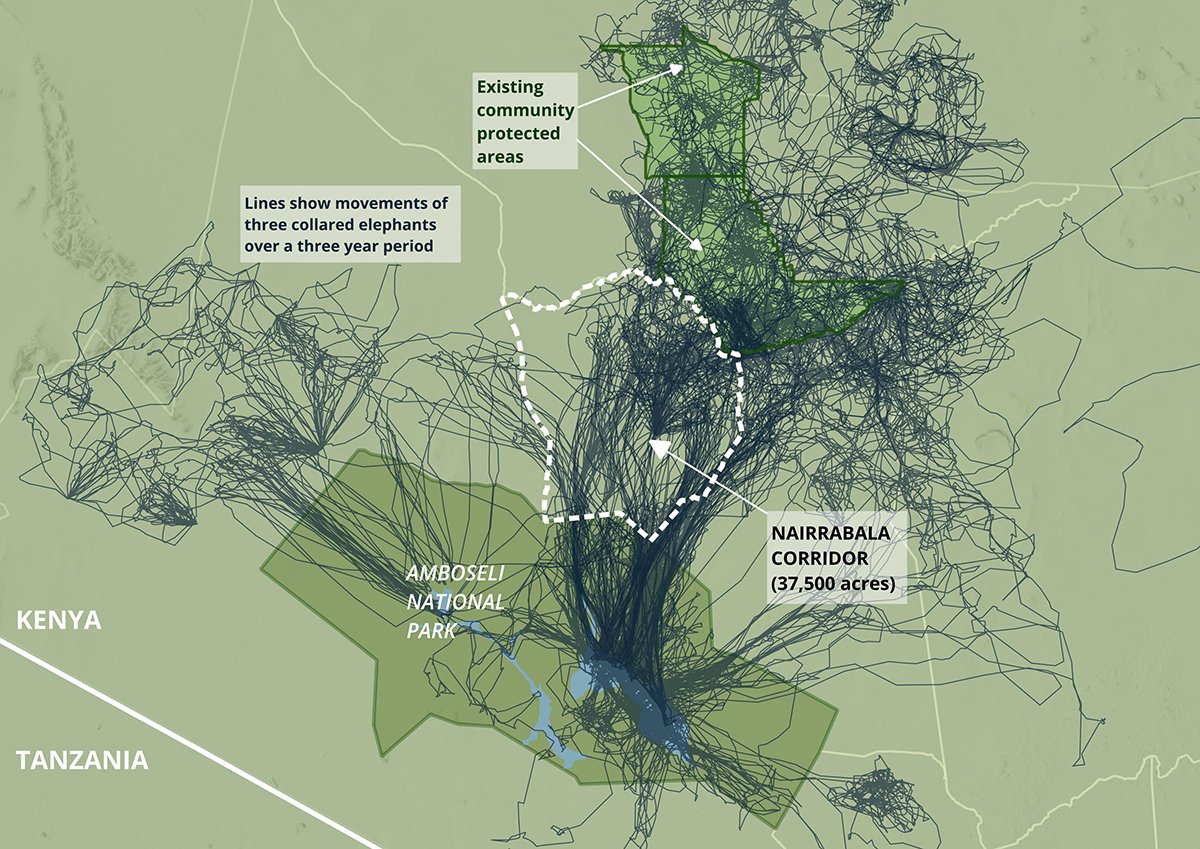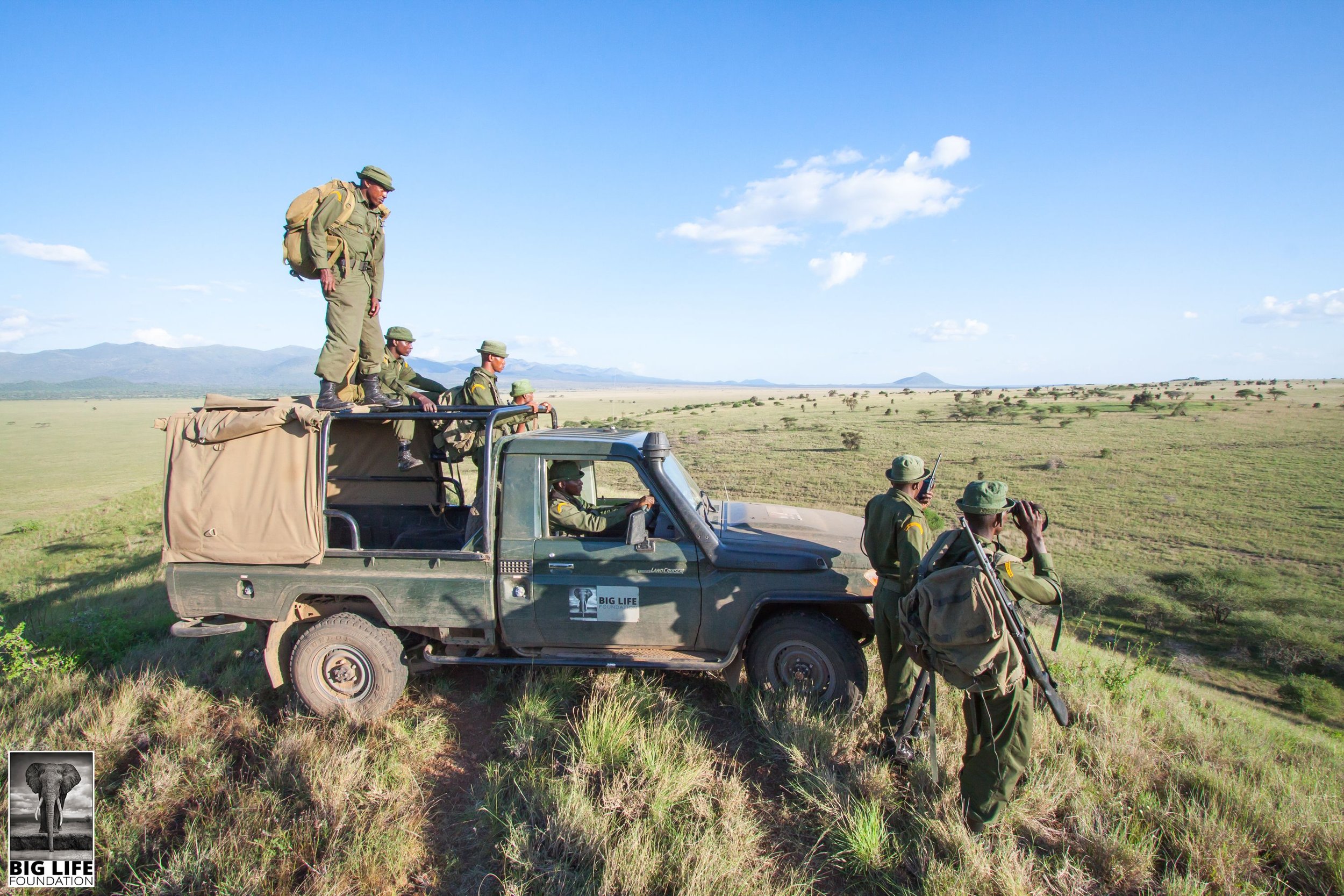Protecting Priority Wildlife Habitats and Corridors in the Greater Amboseli Ecosystem
Partner: Big Life Foundation
Launched: April 2022
Big Life Rangers (Image by Jeremy Goss)
Land Lease Initiative and Formation of the Nairrabala Conservancy
The Amboseli-Tsavo-Kilimanjaro (Greater Amboseli) ecosystem in East Africa is an extraordinarily biodiverse landscape and home to many threatened wildlife species, including its renowned elephant population. It is vital that animals can move freely through this ecosystem: an estimated 80% of wildlife migrate from the national park each year to dispersal areas in community lands.
Historically, most of the land has been owned by Maasai communities through structures called “group ranches.” But a fundamental and unprecedented change in land structure has recently occurred, in which ranches have been subdivided into tens of thousands of privately-owned land parcels. Unchecked, this shift could put critical natural habitats in the hands of external land developers and agribusiness—potentially resulting in a collapse of the ecosystem, and damage to local Maasai communities, which depend on a healthy, open natural environment for their livestock and traditional lifestyles.
Big Life, led by its Executive Chairman, Richard Bonham, has been working with Maasai communities in the Greater Amboseli ecosystem for almost 30 years, with demonstrated success in overcoming complex conservation problems and building strong community relationships. In partnership with Big Life, CCF has for two years supported an initiative to protect 1.2 million acres of these key wildlife habitats and movement pathways. This strategy includes delineating conservation areas through land-use planning and legislation, as well as signing land-lease agreements with Maasai landowners to restrict harmful land uses in key habitats (e.g., no boreholes or sales to agribusiness; requirement to keep it wild).
CCF’s support of Big Life in this subdivision process extends across the key community areas of Kimana, Eselengei, Mbirikani, Olgulului, and Kuluku. In 2023, we facilitated the complicated signing of over 2,000 individual 20-year land leases to landowners, with payments that must be renewed each year. Ideally, we hope to recruit a cohort of private donors to help us sustain this effort over the duration of our commitment. This will establish the protection of key wildlife habitats alongside sustainable revenue streams to local Maasai, ensuring incentives for the land to be protected into the future.
April 2024 saw a vitally important leap forward of conservation efforts in the greater Amboseli region through one of these leasing programs. This was the formal announcement by Big Life of the Nairrabala Conservancy (roughly translating to “open place”)—a 37,433-acre wildlife corridor that connects Amboseli National Park with the north of the ecosystem, where collared elephants have been shown to bottleneck in their migratory patterns. As the area and its wildlife need vigilant protection, Big Life selected ten new rangers from the Olgulului ranch where Nairrabala is located who are being trained and will soon enter the field operating as a mobile ranger team.
Impact Overview:
2022: 1.2M investment in land leases and conservancy formation initiatives
2023: Funded a further $470,000 for the Nairrabala Corridor
1.2 million acres of land protected, including a 37,433-acre critical wildlife corridor connecting Amboseli National Park with Tsavo

Big Life Rangers on Patrol (Image by Jeremy Goss)

Nairrabala Elephant Movement

Big Life Rangers Surveying the Landscape (Image by Jeremy Goss)

